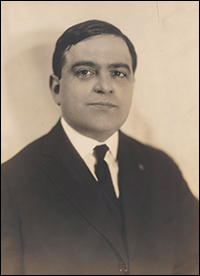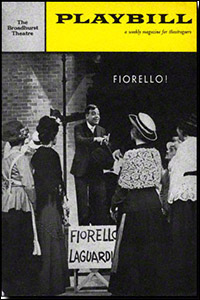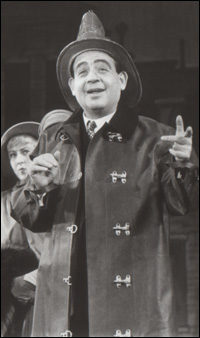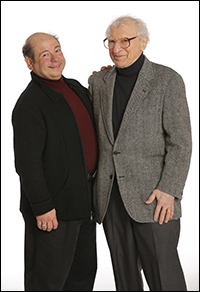
*
When Encores! began in 1994, it began with Fiorello!, in tribute to the crusading fireplug of a mayor who had, among his many achievements, saved New York City Center from the wrecking ball and dedicated it as Manhattan's first performing arts center. As Encores! enters its 20th season, it seemed appropriate to once again celebrate the Little Flower, a folk hero in the urban landscape of New York City.
Fiorello! premiered just as the '50s were coming to an end, and marked the beginning of the last great decade of the classic musical on Broadway. The Rodgers and Hammerstein era lasted 17 years — from Oklahoma! in 1943 until The Sound of Music in 1960. But their adventurous, genuinely dominant period really ended with The King and I, just as the 1950s were beginning. That meant opportunity for new young teams of composers and lyricists, many of whom had their first successes under the producing aegis of Harold Prince in shows directed and co-written by George Abbott; both men liked the challenge of young talent. Abbott was older — he'd been working on Broadway since 1913. Prince was a kid, and had a natural affinity for turning up the next generation of artists.
 |
||
| Fiorello LaGuardia |
||
| courtesy of the Museum of the City of New York |
"I was very surprised by Abbott — I came into the process thinking he was the anything-for-a-laugh master of farce, but he was like Stanislavsky in a way — he only wanted what was honest. And as much as I learned about Abbott through the process, I actually didn't know much about LaGuardia either when we went to work on it. But as I worked, I began to idolize him. And that's what I hope shows through all of it. He was a hero."
 |
||
| Playbill cover from the original Broadway production |
But Fiorello!, which launched their careers, was a young show, and plays like one even today. Weidman and Abbott made the surprising choice not to tell of Fiorello's famous exploits as the crusading mayor of New York, and instead focused on his years as a young reform-minded attorney who ran against the Tammany machine against all odds, and won. The famous LaGuardia years were really the late '30s and '40s, but the musical begins in 1912 and ends in 1933.
Its spirit of youth extends to the score itself. Like the young LaGuardia, Bock and Harnick were fearlessly beginning, and had the courage of their convictions.
 |
||
| Tom Bosley in the original Broadway production of Fiorello! |
Both composer and lyricist spoke with a kind of unforced originality that sometimes attends those who have little to lose and everything to gain. The score of Fiorello! celebrates the bold, young agit-prop language of the shirtwaist factory strike of 1912, the comic frustrations and bewilderments of young love, the dedication of youthful community organizers and, in a couple of comedy sextets, the kind of revuelike material that was typical of young songwriters of the period, though at an unusually high level — the jokes are actually funny. "The one spot we could never solve," Harnick recalls, "was a moment in the second act. LaGuardia's wife has died, he's just been beaten badly by Jimmy Walker for mayor, and it's a ripe spot for him to express something — but the two songs we wrote were thrown out. Abbott found them both self-pitying, and he had no time for self-pity. We settled for a short reprise of 'The Name's LaGuardia.' About 15 or 20 years ago, I saw a production and thought, 'this is really a copout,' and so began a 10-year argument with Jerry Bock, who really didn't think we needed to go back to the show, which, he pointed out, had won the Pulitzer. I tried a lot of different approaches, and finally came up with one — an anti-Jimmy Walker song — and Jerry read it, and said, 'That I can set.' It was the last thing he wrote before he died."
 |
||
| City Center Fiorello! star Danny Rutigliano with Sheldon Harnick |
||
| Photo by Joan Marcus |
When called upon, the team could conjure periods, from the lilting waltzes of pre-World War I America to the razzmatazz of the Jazz Age. And they could be quick and professional. As the show's orchestrator, Irwin Kostal, recalled in an unpublished memoir, "During the tryout, just before the New York opening, Sheldon and Jerry were called upon to do the impossible and write a showstopper, and it had to go in the next night. This was the kind of situation George Abbott thrived on, and his energy inspired everybody in the show. With a typical combination of creativity, necessity and a lot of trepidation, Sheldon and Jerry wrote 'Little Tin Box' in one night. It was rehearsed the next morning, orchestrated and copied that day and was in the show that night, all within 24 hours. That's Broadway at its best, people rising to the occasion, doing the impossible. Everything comes together just as time runs out."
Actually, according to Harnick, "Jerry Bock had gone to the movies that night, and I had this idea for the song, and took a piece of music he'd written for one of our audition songs that had been discarded. When Jerry got back from the movies I said to him, 'We wrote a new song tonight.' And he said, 'That's nice, how's my music?' When I played it for him he was very happy, but it still needed music for the chorus, so he stayed up all night and finished it."
But for all the exigencies of their showbiz trial by fire, Bock and Harnick also demonstrated a tenderness and maturity that was completely unexpected. In one extraordinary love song called "When Did I Fall In Love" they seized the opportunity to fly free, including an extended verse and a fresh musical interlude that allows an unexpectedly emotional note to enter a world that is largely dominated by tough politicians and bristling New Yorkers. The song is a promise of even greater things to come from the team, and, indeed, Fiorello! is the first youthful expression of a musical and lyric voice that would continue to reach and grow for a decade, through the team's last collaboration, The Rothschilds, in 1970.
Before decade's end, Jerry Herman, Kander and Ebb, and Strouse and Adams had entered the fray, not to mention Stephen Sondheim. But in many respects the '60s (and especially the mid-'60s) were, and should be remembered as, the Bock and Harnick years. The show today exists as a kind of double-nostalgic valentine, first to the nineteen-teens and '20s, and secondly to the self-assured musicals of the '60s, when Prince and Abbott and a cluster of talented directors, choreographers, designers, librettists and actors went to work every day turning out works that were designed to amuse us for a season, and that, somehow, have managed to stand the test of time for the half century that has followed. Doubtless 20 years from now, it will be time for Fiorello! again.
(Jack Viertel is artistic director of Encores! This piece appears in the January 2013 Playbill for New York City Center.)
Watch Playbill Video rehearsal highlights of the Encores! revival of Fiorello!










